Figure 1: Article titles obscuring citation network topography. Image by Denis
Y Tenen.
**In the framework of the[Authorship](http://www.akademie-
solitude.de/en/events/~no3764/) project, Akademie Schloss Solitude together
with former and current fellows initiated a debate on the status of the author
in the 21st century as well as closely related questions on the copyright
system. The event »[Custodians.online – The Struggle over the Future of
›Pirate‹ Libraries and Universal Access to Knowledge](http://www.akademie-
solitude.de/en/events/custodiansonline-the-struggle-over-the-future-of-pirate-
libraries-and-universal-access-to-knowledge~no3779/)« was part of the debate
by which the Akademie offers its fellows to articulate diverse and already
long existing positions regarding this topic. In this article, published in
the special online-issue on _[Authorship](http://schloss-
post.com/category/issues/authorship/), _ Dennis Yi Tenen, PiracyLab/Columbia
University, New York, reports his personal experiences from the
»[Custodians.online](http://custodians.online/)« discussion. Edited by
Rosemary Grennan, MayDay Rooms, London/UK.**
I am on my way to the Free Library Congress at Akademie Schloss Solitude, in
Stuttgart. The event is not really called the »Free Library Congress,« but
that is what I imagine it to be. It will be a meeting about the growing
conflict between those who assert their intellectual property rights and those
who assert their right to access information freely.
Working at a North American university, it is easy to forget that most people
in the United States and abroad lack affordable access to published
information – books, medical research, science, and law. Outside of a
university subscription, reading a single academic article may cost upwards of
several hundred dollars. The pricing structure precludes any meaningful idea
of independent research.
Imagine yourself a physician or a young scientist somewhere in the global
south, or in Eastern Europe, or anywhere really without a good library and
without the means to pay exorbitant subscription prices demanded by the
distributors. How will you keep current in your field? How are you to do right
for your patients in following the latest treatment protocols? What about
citizen science or simply due diligence on the part of patients, litigants, or
primary school students in search for reputable sources? Wherever library
budgets do not soar into the millions, research involves building archives
that exist outside of the intellectual property regime. It involves the
organizational effort required to collect, sort, and share information widely.
A number of prominent sites and communities emerged in the past decade in an
attempt to address the global imbalance of access to information. Among them,
Sci-Hub. [1] Founded by Alexandra Elbakyan, a young neuroscientist from
Kazakhstan, the site makes close to 50 million scientific articles available
for download. Elbakyan describes the mission of her library as »removing all
barriers that impede the widest possible distribution of knowledge in human
society.« Compare this with Google’s mission »to organize the world’s
information and make it universally accessible and useful.« [2] The two
visions are not so different. Sci-Hub violates intellectual property law in
many jurisdictions, including the United States. Elsevier, one of the world’s
largest scientific publishers, has filed a complaint against Sci-Hub in New
York Southern District Court. [3] Of course, Google also continually finds
itself at odds with intellectual property holders. The very logic of
collecting and organizing human knowledge is, fundamentally, a public works
project at odds with the idea of private intellectual property.
Addressing the judge directly in her defense, Elbakyan appeals to universal
ethical principles, like those enshrined in Article 27 of the United Nations
Declaration of Human Rights, which holds that: »Everyone has the right to
freely participate in the cultural life of the community, to enjoy the arts
and to share in scientific advancement and its benefits.« [4] [5] Her
language – our language – evokes also the »unquiet« history of the public
library. [6] I call this small, scrappy group of artists, academics,
librarians, and technologists »free« to evoke the history of »free and public«
libraries and to appeal also to the intellectual legacy of the free software
movement: as Richard Stallman famously put it »free as in free speech not as
in free beer.« [7]
The word »piracy« is also often used to describe the online free library
world. For some it carries an unwelcome connotation. In most cases, the
maintenance of large online archives is a drain on resources, not
profiteering. It resembles much more the work of a librarian than that of a
corsair. Nevertheless, many in the community actually embrace a few of the
political implications that come with the idea of piracy. Piracy, in that
sense, appeals to ideas and strategies similar to those of the Occupy
Movement. When public resources are unjustly appropriated and when such
systematic appropriation is subsequently defended through the use of law and
force, the only available response is counter occupation.
The agenda notes introducing the event calls for a »solidarity platform« in
support of free online public libraries like Sci-Hub and Library Genesis,
which increasingly find themselves in legal peril. I do not yet know what the
organizers have in mind, but my own thoughts in preparation for the day’s
activities revolve around the following few premises:
1\. The case for universal and free access to knowledge is stronger when it is
made on ethical, technological, and **tactical** grounds, not just legal.
The cost of sharing and reproduction in the digital world are too low to
sustain practices and institutions built on the assumptions of print. The
attempt to re-introduce »stickiness« to electronic documents artificially
through digital rights management technology and associated legislation like
the Digital Millennium Copyright Act are doomed to fail. Information does not
(and cannot) »want« to be free, [8] but it definitely has lost some of its
purchase on the medium when words moved from vellum to magnetic charge and
subsequently to solid storage medium that – I kid you not – works through
mechanisms like quantum tunneling and electron avalanche injection.
2\. Any proposed action will require the close **alignment of interests**
between authors, publishers, readers, and librarians.
For our institutions to catch up to the changing material conditions *and* our
(hopefully not so rapidly changing) sense of what’s right and wrong in the
world, writers, readers, publishers, and archivists need to coordinate their
action. We are a community. And I think we want more or less the same thing:
to reach an audience, to find and share information, and to remain a vital
intellectual force. The real battle for the hearts and minds of an informed
public lies elsewhere. Massive forces of capital and centralization threaten
the very existence of a public commons. To survive, we need to nurture a
conversation across organizational boundaries.
By my calculations, Library Genesis, one of the most influential free online
book libraries sustains itself on a budget of several thousand dollars per
year. [9] The maintenance of Sci-Hub requires a bit more to reach millions of
readers. [10] How do pirate libraries achieve so much with so little? The
fact that these libraries do not pay exorbitant license fees can only comprise
a small part of the answer. The larger part includes their ability to rely on
the support of the community, in what I have called elsewhere »peer
preservation.« Why can’t readers and writers contribute to the development of
infrastructures within their own institutions? Why are libraries so reliant on
outside vendors, who take most of the profits out of our ecosystem?
I am conflicted about leaving booksellers out of the equation. In response
about my question about booksellers – do they help or hinder project of
universal access? – [Marcell Mars](https://www.memoryoftheworld.org/nenad-
romic-aka-marcell-mars/) spoke about »a nostalgia for capitalism we used to
know.« [Tomislav Medak](https://www.memoryoftheworld.org/tomislav-medak/)
spoke in defense of small book publishers that produce beautiful objects. But
the largest of booksellers are no longer strictly in the business of selling
books. They build cloud infrastructures, they sell online services to the
military, build autonomous drones, and much much more. The project of
corporate growth just may be incompatible with the project to provide free and
universal access to information.
3\. Libraries and publishing conclude a **long chain of literary production**.
Whatever ails the free library must be also addressed at the source of
authorship.
Much of the world’s knowledge is locked behind paywalls. Such closed systems
at the point of distribution reflect labor practices that also rely on closed
and proprietary tools. Inequities of access mirror inequities of production.
Techniques of writing are furthermore impoverished when writers are not free
to modify their instruments. This means that as we support free libraries we
must also convince our peers to write using software that can be freely
modified, hacked, personalized, and extended. Documents written in that way
have a better chance of ending up in open archives.
4\. We need **more empirical evidence** about the impact of media piracy.
The political and economic response to piracy is often guided by fear and
speculation. The work of researchers like [Bodo
Balazs](http://www.warsystems.hu/) is beginning to connect the business of
selling books with the practices of reading them. [11] Balazs makes a
powerful argument, holding that the flourishing of shadow media markets
indicates a failure in legitimate markets. Research suggests that piracy does
not decrease, it increases sales, particularly in places which are not well-
served by traditional publishers and distributors. A more complete, »thick
description« of global media practice requires more research, both qualitative
and quantitative.
5\. **Multiplicity is key**.
As everyone arrives and the conversation begins in earnest, several
participants remark on the notable absences around the table. North America,
Eastern and Western Europe are overrepresented. I remind the group that we
travel widely and in good company of artists, scholars, activists, and
philosophers who would stand in support of what [Antonia
Majaca](http://izk.tugraz.at/people/faculty-staff/visiting-professor-antonia-
majaca/) has called (after Walter Mignolo) »epistemic disobedience« and who
need to be invited to this table. [12] I speak up to say, along with [Femke
Snelting](http://snelting.domainepublic.net/) and [Ted
Byfield](http://nettime.org/), that whatever is meant by »universal« access to
knowledge must include a multiplicity of voices – not **the** universal but a
tangled network of universalisms – international, planetary, intergalactic.
1. Jump Up
2. Jump Up [https://www.google.com/about/company/>](https://www.google.com/about/company/>)
3. Jump Up
4. Jump Up
5. Jump Up
6. Jump Up In reference to Battles, Matthew. _Library: An Unquiet History._ New York: Norton, 2003.
7. Jump Up
8. Jump Up Doctorow, Cory, Neil Gaiman, and Amanda Palmer. _Information Doesn’t Want to Be Free: Laws for the Internet Age_. San Francisco: McSweeney’s, 2014.
9. Jump Up
10. Jump Up
11. Jump Up See for example Bodo, B. 2015. [Eastern Europeans in the pirate library] – _Visegrad Insight_ 7 1.
12. Jump Up
[Dennis Yi Tenen](https://schloss-post.com/person/dennis-yi-tenen/), New
York/USA
[Dennis Yi Tenen](http://denten.plaintext.in/) is an assistant professor of
English and Comparative Literature at Columbia University. He is the author of
the forthcoming »Plain Text: The Poetics of Human-Computer Interaction«.
Barok
Shadow Libraries
2018
_A talk given at the [Shadow Libraries](http://www.sgt.gr/eng/SPG2096/)
symposium held at the National Museum of Contemporary Art (EMST) in
[Athens](/Athens "Athens"), 17 March 2018. Moderated by [Kenneth
Goldsmith](/Kenneth_Goldsmith "Kenneth Goldsmith") (UbuWeb) and bringing
together [Dusan Barok](/Dusan_Barok "Dusan Barok") (Monoskop), [Marcell
Mars](/Marcell_Mars "Marcell Mars") (Public Library), [Peter
Sunde](/Peter_Sunde "Peter Sunde") (The Pirate Bay), [Vicki
Bennett](/Vicki_Bennett "Vicki Bennett") (People Like Us), [Cornelia
Sollfrank](/Cornelia_Sollfrank "Cornelia Sollfrank") (Giving What You Don't
Have), and Prodromos Tsiavos, the event was part of the _[Shadow Libraries:
UbuWeb in Athens](http://www.sgt.gr/eng/SPG2018/) _programme organised by [Ilan
Manouach](/Ilan_Manouach "Ilan Manouach"), Kenneth Goldsmith and the Onassis
Foundation._
This is the first time that I was asked to talk about Monoskop as a _shadow
library_.
What are shadow libraries?
[Lawrence Liang](/Lawrence_Liang "Lawrence Liang") wrote a think piece for _e-
flux_ a couple of years ago,
in response to the closure of Library.nu, a digital library that had operated
from 2004, first as Ebooksclub, later as Gigapedia.
He wrote that:
[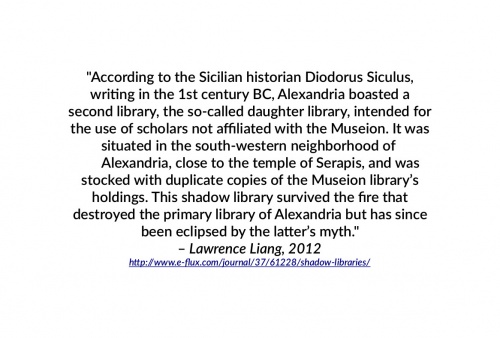](http://www.e-flux.com/journal/37/61228
/shadow-libraries/)
In the essay, he moves between identifying Library.nu as digital Alexandria
and as its shadow.
In this account, even large libraries exist in the shadows cast by their
monumental precedessors.
There’s a lineage, there’s a tradition.
Almost everyone and every institution has a library, small or large.
They’re not necessarily Alexandrias, but they strive to stay relevant.
Take the University of Amsterdam where I now work.
University libraries are large, but they’re hardly _large enough_.
The publishing market is so huge that you simply can’t keep up with all the
niche little disciplines.
So either you have to wait days or weeks for a missing book to be ordered
somewhere.
Or you have some EBSCO ebooks.
And most of the time if you’re searching for a book title in the catalogue,
all you get are its reviews in various journals the library subscribes to.
So my colleagues keep asking me.
Dušan, where do I find this or that book?
You need to scan through dozens of texts, check one page in that book, table
of contents of another book, read what that paper is about.
[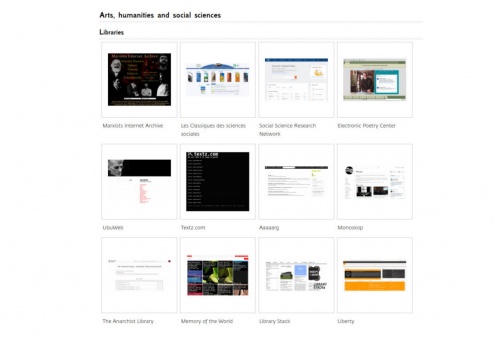](/Digital_libraries#Libraries
"Digital libraries#Libraries")
Or scrapes it from somewhere, since most books today are born digital and live
their digital lives.
...
Digital libraries need to be creative.
They don’t just preserve and circulate books.
[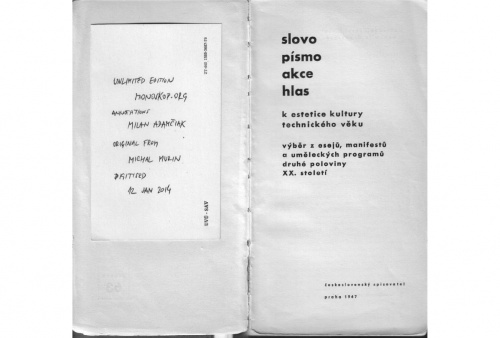](https://monoskop.org/log/?p=10262)
They engage in extending print runs, making new editions, readily
reproducible, unlimited editions.
[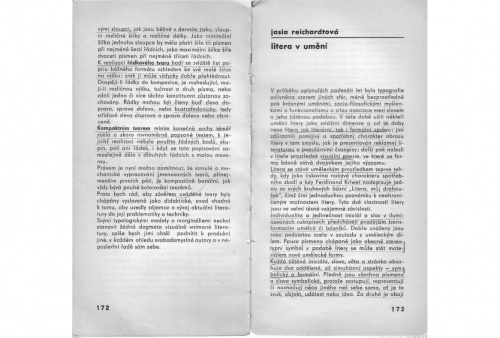](https://monoskop.org/images/d/de/Hirsal_Josef_Groegerova_Bohumila_eds_Slovo_pismo_akce_hlas.pdf#page=87)
This one comes with something extra. Isn’t this beautiful? You can read along
someone else.
In this case we know these annotations come from the Slovak avant-garde visual
poet and composer [Milan Adamciak](/Milan_Adamciak "Milan Adamciak").
[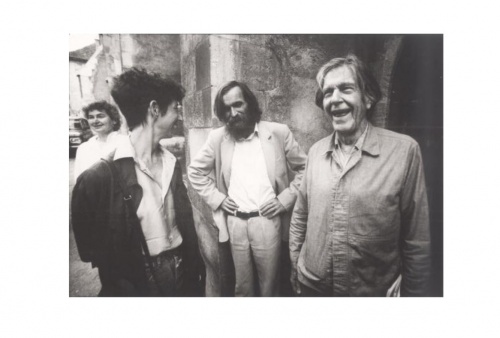](/Milan_Adamciak
"Milan Adamciak")
...standing in the middle.
A couple of pages later...
[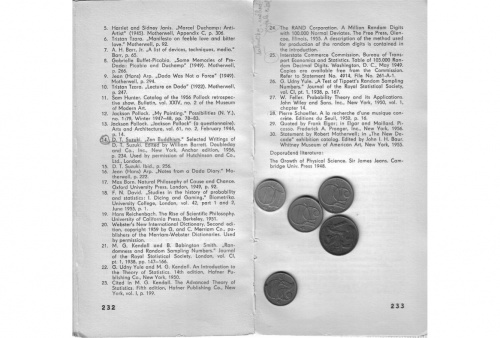](https://monoskop.org/images/d/de/Hirsal_Josef_Groegerova_Bohumila_eds_Slovo_pismo_akce_hlas.pdf#page=117)
...you can clearly see how he found out about a book containing one million
random digits [see note 24 on the image]. The strangest book.
[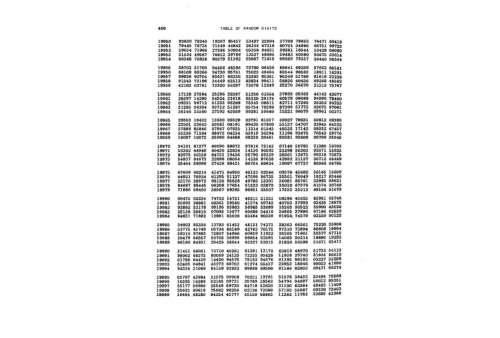](https://monoskop.org/log/?p=5780)
He was still alive when we put it up on Monoskop, and could experience it.
...
Digital libraries may seem like virtual, grey places, nonplaces.
But these little chance encounters happen all the time there.
There are touches. There are traces. There are many hands involved, visible
hands.
They join writers’ hands and help creating new, unlimited editions.
They may be off Google, but for many, especially younger generation these are
the places to go to learn, to share.
Rather than in a shadow, they are out in the open, in plain sight.
[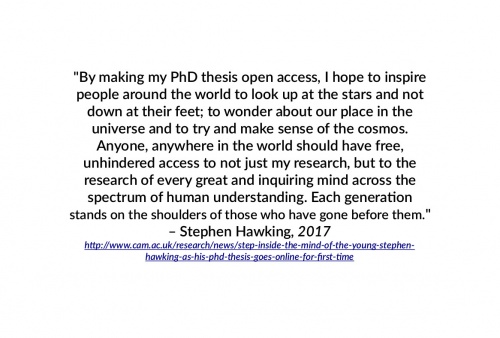](http://www.cam.ac.uk/research/news
/step-inside-the-mind-of-the-young-stephen-hawking-as-his-phd-thesis-goes-
online-for-first-time)
This made rounds last year.
As scholars, as authors, we have reasons to have our works freely accessible
by everyone.
We do it for feedback, for invites to lecture, for citations.
Sounds great.
So when after long two, three, four, five years I have my manuscript ready,
where will I go?
Will I go to an established publisher or an open access press?
Will I send it to MIT Press or Open Humanities Press?
Traditional publishers have better distribution, and they often have a strong
brand.
It’s often about career moves and bios, plans A’s and plan B’s.
There are no easy answers, but one can always be a little inventive.
In the end, one should not feel guilty for publishing with MIT Press.
But at the same time, one should neither feel guilty for scanning and sharing
such a book with others.
...
You know, there’s fighting, there are court cases.
[Aaaaarg](/Aaaaarg "Aaaaarg"), a digital library run by our dear friend [Sean
Dockray](/Sean_Dockray "Sean Dockray"), is facing a Canadian publisher.
Open Library is now facing the Authors Guild for lending scanned books
deaccessioned from libraries.
They need our help, our support.
But collisions of interests can be productive.
This is what our beloved _Cabinet_ magazine did when they found their PDFs
online.
They converted all their articles into HTML and put them online.
The most beautiful takedown request we have ever received.
[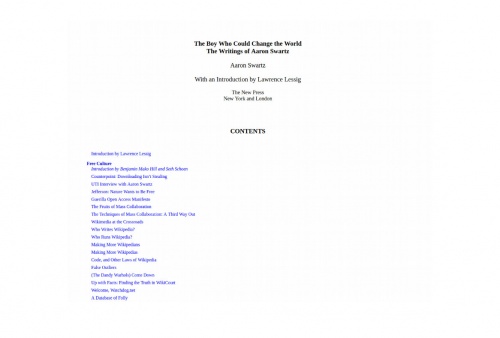](https://monoskop.org/log/?p=16598)
So what is at stake? What are these digital books?
They are poor versions of print books.
They come with no binding, no paper, no weight.
They come as PDFs, EPUBs, JPEGs in online readers, they come as HTML.
By the way, HTML is great, you can search it, copy, save it, it’s lightweight,
it’s supported by all browsers, footnotes too, you can adapt its layout
easily.
That’s completely fine for a researcher.
As a researcher, you just need source code:
you need plain text, page numbers, images, working footnotes, relevant data
and code.
_Data and code_ as well:
this is where online companions to print books come in,
you want to publish your research material,
your interviews, spreadsheets, software you made.
...
Here we distinguish between researchers and readers.
As _readers_ we will always build our beautiful libraries at home, and
elsewhere,
filled with books and... and external harddrives.
...
There may be _no contradiction_ between the existence of a print book in
stores and the existence of its free digital version.
So what we’ve been asking for is access, basic access. The access to culture
and knowledge for research, educational, noncommercial purposes. A low budget,
poor bandwidth access. Access to badly OCR’d ebooks with grainy images. Access
to culture and knowledge _light_.
Thank you.
Dusan Barok
_Written on 16-17 March 2018 in Athens and Amsterdam. Published online on 21
March 2018._